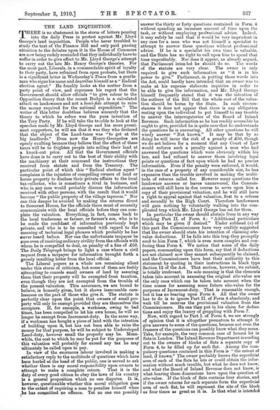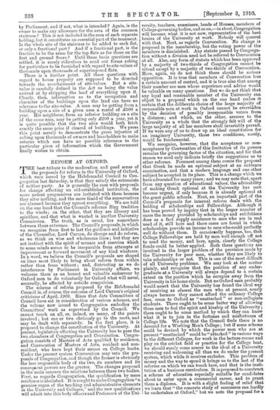THE LAND INQUISITION.
THERE is no abatement in the storm of letters pouring into the daily Press in protest against Mr. Lloyd George's land inquisition. People who never troubled to study the text of the Finance Bill and only paid passing attention to the debates upon it in the House of Commons are now being rudely reminded that they individually have to suffer in order to give effect to Mr. Lloyd George's attempt to carry out the late Mr. Henry George's theories. For the most part, Liberals, in a commendable spirit of loyalty to their party, have refrained from open protests, but there is a significant letter in Wednesday's Times from a gentle- man who signs his name and describes himself as a" Radical election agent." He frankly looks at the matter from a party point of view, and expresses his regret that the Government should allow officials "to give colour to the Opposition theory that the recent Budget is a calculated attack on landowners and not a bonaVide attempt to raise the money required for the national expenditure." The writer of this letter doubtless believes sincerely that the theory to which he refers was the pure invention of the Tory Party. If he will take the trouble to look at the speeches made by Mr. Lloyd George and his more promi- nent supporters, he will see that it was they who declared that the object of the Land-taxes was "to get at the big landlords." Even now the Henry-Georgeites are openly exulting because they believe that the effect of these taxes will be to frighten people into selling their land at a knock-out price. All that the Government officials have done is to carry out to the best of their ability with the machinery at their command the instructions they received from statute and from the Treasury. The particular point of which this "Radical election agent" complains is the injustice of compelling owners of land. or house property to disclose their private affairs to the local tax-collector, who is sometimes a rival in business, and who in any case would probably discuss the information received with other persons, with the result that it would become 'the public property of the village taproom." Nor can this danger be avoided by making the returns direct to Somerset House, for the officials there must of necessity communicate with the local officials before they can com- plete the valuation. Everything, in fact, comes back to the local tradesman or farmer, or farmer's son, who is to be made the confidant of information previously kept private, and who is to be consulted with regard to the meaning of technical legal phrases which probably he has triever heard before. Nor can the unfortunate taxpayer be sure even of receiving ordinary civility from the officials with whom he is compelled to deal, on penalty of a fine of £50. The Daily Telegraph brings to light a case where a civil request from a taxpayer for information brought forth a grossly insulting letter from the local official. The Liberal papers as a whole are remaining silent under this storm of criticism, but some of them are feebly attempting to console small owners of land by assuring them that their property will be exempted from taxation, even though they are not exempted from the trouble of the present valuation. This assurance, we are bound to believe, is honestly given, but it shows inexcusable care- lessness on the part of those who give it. The statute is perfectly clear upon the point that owners of small pro- perty will only be exempt provided they are themselves the occupiers. If, for example, a, workman, owing to bad times, has been compelled to let his own house, he will no longer be exempt from Increment-duty. In the same way, if a workman has bought a piece of land with the intention of building upon it, but has not been able to raise the money for that purpose, he will he subject to Undeveloped Land-duty, however small the property may be. Mean- while, the cost to which he may be put for the purposes of this valuation will probably far exceed any tax he may ultimately be called upon to pay. In view of the enormous labour involved in making a satisfactory reply to the multitude of questions which have been hurled at the head of the public, one is moved to ask whether there is any moral responsibility upon owners to attempt to make a complete return. That it is the duty of every good citizen to obey the laws of his country is a general proposition which no one disputes. It is, however, questionable whether this moral obligation goes to the extent of requiring a man to penalise himself when • he has counnitted no offence. Yet no one can possibly answer the thirty or forty questions contained in Form 4 without spending an immense amount of time upon the task, or without employing professional advice. Indeed, it may safely be said that it would be very imprudent in any case for a man who was not himself a specialist to attempt to answer these questions without professional advice. If he is a specialist his own time is 'valuable, and the State has no right to call upon him to spend that time unprofitably. Nor does it appear, as already argued, that Parliament intenled he should do so. The words of the statute are very clear. The owner is only required to give such information as "it is in his power to give." Parliament, in putting these words into the Act, could hardly have intended that an owner was to make at his expense elaborate inquiries in order to be able to give the information, and Mr. Lloyd George himself frequently stated that it was the intention of the authors of the Bill that the whole cost of the valua- tion should be borne by the State. In such circum- stances it does not appear that there is any obligation resting upon the individual to put himself to any trouble to answer the interrogatories of the Board of Inland Revenue. Such information as he has readily accessible he ought to give, provided he is quite sure that he understands the questions he is answering. All other questions he will wisely answer "Not known." It may be that by so doing he will incur the risk of a, penalty of £50, though we do not believe for a moment that any Court of Law would enforce such a penalty against a man who had answered the questions which were obviously within his ken, and had refused to answer those involving legal points or questions of fact upon which he had no precise information. Even if the penalty were enforced, it would, in the case of a property of any considerable size, be less expensive than the trouble involved in making the multi- tude of returns called for. However many questions the landowner answers or leaves unanswered, the Commis- sioners will still have in due course to serve upon him a copy of their provisional valuation, and he will still have a right to appeal against that valuation, first to a referee and secondly to the High Court. Therefore landowners will gain nothing by voluntarily walking into the com- plicated trap which Mr. Lloyd George has set for them.
In particular the owner should abstain from in any way touching Part II. of Form 4: "Additional particulars which may be given if desired." Under subhead (v) of this part the Commissioners have very craftily suggested that the owner should state his intention of claiming site- value deductions. If he falls into this trap they promptly send to him Form 7, which is even more complex and con- fusing than Form 4. We notice that some of the daily papers, commenting upon this form, say that if deductions are not claimed now they cannot subsequently be claimed, and the Commissioners have lent their authority to this statement by quoting in their instructions in black type Section 12 of the Act. That section, however, we submit, is totally irrelevant. Its sole meaning is that the elements taken into account in assessing the original site-value are the only ones which can be taken into account when the time comes for assessing some future site-value for the purposes of Increment-duty. That is reasonable enough, but it has no bearing upon Form 4. All that the owner has to do is to ignore Part II. of Form 4 absolutely, and wait till he receives the provisional valuation from the Commissioners. He can then put in his claim for deduc- tions and enjoy the luxury of grappling with Form 7. Now, with regard to Part I. of Form 4, we are strongly of opinion that it is altogether premature to attempt tc give answers to some of the questions, because not even the framers of the questions can possibly know what they mean. Take, for example, the very common case of houses let in flats in London. The Inland Revenue Department is sending out to the owners of blocks of fiats a separate copy of Form 4, to be filled up for each flat. Among the com- pulsory questions contained in this Form is "the extent of land, if known." The owner probably knows the superficial area of each of the flats he lets or could obtain the infor- mation without much trouble, but what he does not know, and what the Board of Inland Revenue does not know, is what bearing these dimensions have upon the question of site-value. If the block of flats contains four stories, and if the owner returns for each separate form the superficial area of each flat, he will represent the site of the block as four times as great as it is. Is that what is intended by Parliament, and if not, what is intended ? Again, is the owner to make any allowance for the area of the common staircase ? This is not included in the area of each separate holding, but it constitutes an essential part of the tenement. Is the whole site of the staircase to be added to each flat, or only a fractional part? And if a fractional part, is the fraction to be the same for the top flats as for those on the first and ground floors ? Until these basic questions are settled, it is surely ridiculous to send out forms asking for particulars to be furnished with regard to site-values of thousands upon thousa.nds of superimposed flats. There is a further point. All these questions with regard to house property are supposed to be directed towards the ascertainment of site-values. But a site. value is carefully defined in the Act as being the value arrived at by stripping the land of everything upon it. Clearly, then, information as to the occupation and character of the buildings upon the land can have no relevance to the site-value. A man may be getting from a building upon a site of a given area a rental of £500 a year. His neighbour, from an inferior building on a site of the same area, may be getting only £200 a year, yet it is quite possible that the two sites would both fetch exactly the same price if cleared of buildings. We press this point merely to demonstrate the gross injustice of calling upon thousands of owners and leaseholders to make returns which can have no possible relevance to the particular piece of information which the Government finally wishes to obtain.











































 Previous page
Previous page